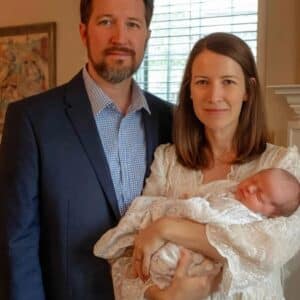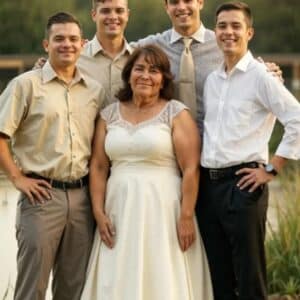When Lily finally started walking with her head high again, I thought the worst was behind us. My daughter had been through so much—years of surgeries, endless doctor visits, stares from strangers—but she’d come out of it braver, stronger, and finally, confident in her own skin. I never imagined something as simple as a family dinner would threaten to unravel all that progress.
Rachel, my fiancée, had always seemed supportive. She said the right things, treated Lily kindly, and encouraged us to spend time as a family. When her parents invited us over for dinner, I was a little nervous—Lily’s limp still drew attention, and I didn’t want her to feel self-conscious. So I asked Rachel, gently but firmly, to let her family know not to mention it.
She nodded. “Of course,” she said. “They’ll be respectful.”
Dinner started off well enough. Lily was quiet but polite, answering questions, even smiling when Rachel’s younger brother made a goofy joke. But then Franklin, Rachel’s dad, leaned back in his chair, smirked, and dropped a line I’ll never forget.
“You’re not walking like that at the wedding, right?”
It was like the room exhaled all at once and forgot how to breathe again. Rachel froze. Her mother stared into her lap. I felt my blood boil, but before I could say anything, I turned to Lily.
“Do you want to leave?”
She nodded slightly—but instead of reaching for her coat, she stood up. Wincing as she put weight on her leg, she lifted her chin and locked eyes with Franklin.
“I’ll walk however I want,” she said, voice clear and unwavering. “And I’ll still be better than you.”
The silence was deafening. Franklin’s face turned red, then purple. He slammed his fork on his plate, rattling the dishes. “That’s no way to talk to an elder.”
I waited for Rachel to say something—to defend Lily, to acknowledge the cruelty. But she just sat there, eyes glued to her napkin, like she was willing the conversation to disappear.
I looked at Lily. Her lip was trembling, but her back was straight. “We can go,” I whispered.
She shook her head. Then she looked around the table.
“I thought you were nice people,” she said softly. “I thought you’d care about how I feel. I guess I was wrong.”
Adrian looked like he might cry. Harriet finally spoke, barely above a whisper. “Franklin, that was uncalled for.”
But Franklin just rolled his eyes. “She needs to hear the truth.”
That was it for me. I stood, grabbed Lily’s bag, and turned to her. “Let’s go.”
She hesitated, just a breath, then limped over to me, face set. We were almost to the door when Rachel finally spoke.
“Wait—don’t go. He didn’t mean it.”
I turned to her, my chest tight. “Rachel, if he didn’t mean it, he wouldn’t have said it. And you just sat there.”
She reached out, but I stepped back.
The walk to the car was quiet. The drive even quieter, except for the soft sound of Lily crying beside me.
“Dad,” she said at one point, voice cracking, “do you still want to marry her?”
That question sat with me all night. I’d spent so long planning a perfect wedding, building a perfect life on the outside. But if it didn’t protect the person I loved most, what was the point?
Rachel called the next morning. I didn’t pick up. She texted, apologized, begged to talk. I wasn’t ready.
I called my sister Bernice. She had helped raise Lily when I couldn’t do it alone, and she never sugarcoated things.
“Do you love Rachel?” she asked.
“I don’t know anymore.”
“Love should make you stronger,” she said. “It should make Lily feel safer, not more alone.”
That afternoon, Rachel showed up. She looked wrecked. I met her in the hall so Lily wouldn’t see.
“I’m so sorry,” she said. “I should’ve spoken up.”
“Why didn’t you?” I asked.
“I was scared. I didn’t want to make it worse.”
“You were more afraid of awkwardness than Lily getting hurt.”
She cried. She said she loved me, she loved Lily. But I couldn’t pretend love was enough if it only showed up when it was convenient.
“I need time,” I told her.
She left, and I went to Lily’s room. She was curled up with her old stuffed bunny. When she saw me, she asked the question again, quieter this time.
“Are you gonna leave her?”
“I don’t know,” I said. “But I do know I’ll always choose you.”
A few days passed. Rachel kept texting. One message stood out: “I told my dad he was wrong. He won’t apologize, but I did.”
I appreciated it. But it still wasn’t enough.
A week later, she asked to meet for coffee. I agreed, away from home. I didn’t want Lily to see.
Rachel looked broken when I arrived.
“I’ve started therapy,” she said. “I’ve been thinking a lot. I want to be better.”
“I believe you,” I said. “But Lily can’t be the reason you learn how to be better. She deserves someone who’s already there.”
Rachel’s eyes filled with tears. “So this is it?”
“Yes,” I said softly. “I’m sorry.”
It hurt to walk away. But when I got home and Lily ran to hug me, I knew it was right.
Months passed. Lily began to blossom again. She joined her school’s art club, made friends, started laughing more. She met a boy named Desmond who didn’t care about her limp. I took them to the mall one day, and I watched her run—yes, run—laughing as she chased after him.
One day, I ran into Franklin at the grocery store. He looked surprised.
“How’s Lily?” he asked.
“She’s great,” I replied.
“I didn’t mean to upset her,” he said.
“You did,” I said simply. “Words matter. Especially to kids.”
He looked down. I walked away.
A week later, Harriet sent a letter. She apologized. Said she admired Lily’s courage. Included a watercolor of lilies and daisies. Stay Strong, it read. Lily smiled and tacked it to her board.
Seasons changed. Lily auditioned for the school play. Got a lead role. At opening night, I watched her stride across the stage like she owned it. The audience stood. I couldn’t stop crying.
I dated here and there. Nothing serious. Until I met Renata at the dog park. Her son Emil had a large birthmark across his face. We exchanged smiles—knowing ones.
Lily and Emil became fast friends. Renata and I, too.
She was kind. Steady. Brave. When someone made a comment about Emil’s face at a diner, she didn’t flinch.
“I hope you learn to see more than skin,” she said gently, and kept coloring with her son.
Later, Lily leaned toward me. “She’s brave,” she whispered.
That’s when I knew.
A year later, I proposed. Lily stood by my side when Renata said yes. Our wedding was small, beautiful, and filled with laughter. Lily walked down the aisle before me—limp and all—like she owned the world.
Some people whispered. But our people beamed.
I caught Lily’s eye. I love you, I mouthed.
She mouthed it right back.
In the end, Franklin’s cruelty led us to something better—a home where Lily never had to shrink herself, where she was celebrated for everything that made her different. And where love didn’t hide when things got hard.
If this story touched something in you, pass it along. Maybe someone else out there needs the reminder:
Real love doesn’t flinch. It stands up. It shows up. Always.





